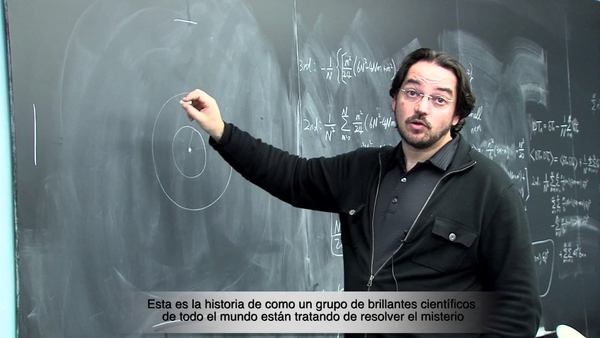First shared prize for the Scientific Short Film of the researcher Enrique Gaztañaga in Ciencia en Acción 2020

The researcher from the Institut d’Estudis Espacials de Catalunya (IEEC) at the Institute of Space Sciences (ICE-CSIC) Enrique Gaztañaga has been awarded the first prize ex-aequo in the Ciencia en Acción 2020 competition, in the modality Scientific Shorts, with the work entitled “2019 THE ACCELERATING COSMOS Part I Chap. III”. This award has been shared with Álex Muntada and Jaume Benet, both from the Facultat de Comunicació Blanquerna of the Universitat Ramon Llull in Barcelona. The different awards were announced in a virtual event that, a priori, had to be held in Murcia on 2-4 October.
Santiago Serrano, also an IEEC researcher at ICE-CSIC, has participated in the production of audiovisual material, with videos showing images of the MICE (Marenostrum Institute of Space Sciences) cosmological simulations carried out by members of the ICE-CSIC Cosmology group: Francisco Castander, Pablo Fosalba and Martin Crocce.
“2019 THE ACCELERATING COSMOS Part I Chap. III” is an outreach documentary that explains the efforts of the scientific community to elucidate what is the cause of the accelerated expansion of the Universe. This scientific short film tells us how the world’s largest digital camera has been installed on a giant telescope to carry out the largest map of the cosmos to date. It is the story of Enrique Gaztañaga and his work in making galaxy maps such as the Spanish initiative PAU (Physics of the Accelerating Universe) and DES (Dark Energy Survey), both galactic mapping projects in which Gaztañaga participates decisively.
But why are these cosmic maps so necessary? The answer comes from a discovery made public in 1998 and awarded the Nobel Prize in Physics in 2011: the Universe is expanding at an accelerated rate. This idea, not alway well known by the general public, challenges our understanding of the fundamental laws of nature and constitutes one of the greatest unsolved mysteries of the cosmos. There seems to be an enigmatic dark matter that holds stars and galaxies together. And an even stranger force, called dark energy, that is accelerating the expansion of the Universe. Combined, both make up 95% of its matter-energy. However its nature is still unknown. As far as we know today the only way to solve the mystery of the accelerated expansion of the Universe is mapping it, that is, creating large galaxy maps such as PAU and DES.
Ciencia en Acción is an international competition aimed at students, lecturers, researchers and disseminators of the scientific community, in any of its disciplines. Its main goal is to present science in an attractive and motivating way. The programme is run by Rosa María Ferré, PhD in Physical Sciences from the University of Barcelona, who has assumed its development over 20 editions since its inception. Several institutions participate in Ciencia en Acción: the Spanish National Research Council (CSIC), the Fundación Lilly, the Fundació Princesa de Girona (FPdGi), the Institute of Mathematical Sciences (ICMAT), the Royal Spanish Physical Society (RSEF), the Royal Spanish Society of Chemistry (RSEQ), the Spanish Astronomy Society (SEA), the Geological Society of Spain (SGE) and the National University of Distance Education (UNED).
You can enjoy the short here, whlie a large version can be found here.
